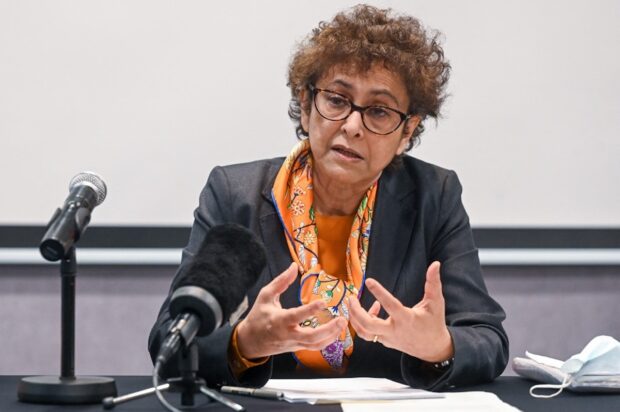Abolish the outdated NTF-Elcac – UN Special Rapporteur Khan

Bangladeshi lawyer Irene Khan is the United Nations special rapporteur on freedom of opinion and expression. (File photo from Agence France-Presse)
(UPDATED)
MANILA, Philippines — United Nations (UN) Special Rapporteur Irene Khan has recommended the abolition of the National Task Force to End Local Communist Armed Conflict (NTF-Elcac), saying that it is already outdated.
During a Friday press briefing in Mandaluyong City, Khan said that the foundations of NTF-Elcac’s creation, through then-President Rodrigo Duterte’s Executive Order No. 70, had changed already.
According to Khan, the NTF-Elcac had not taken into consideration the peace negotiations sought by President Ferdinand Marcos Jr.’s administration with the National Democratic Front of the Philippines.
“NTF-Elcac was established about six years ago in a different context. It is outdated. It does not take into account the ongoing prospects of peace negotiations,” she said.

“I therefore recommend that the task force should be abolished, the abolition would not only address some of the most critical drivers of red-tagging, but it could also allow this administration to modernize peace-building approaches,” she added.
READ: NTF-Elcac to transition into unity and peace task force – official
READ: Group Bayan seeks dismantling of NTF-ELCAC
READ: Malaya: ‘Irresponsible’ to abolish NTF-Elcac right now
Khan also relayed that Philippine officials assured her that the government had no policy of red-tagging individuals. In retrospect, she told officials that the Philippine government also did not have a policy promoting corruption, but there is an anti-corruption policy.
A similar analogy, Khan said, could be used in creating an anti-red tagging policy — including her recommendation of an executive order that would discourage and disincentivize this practice.
“First, the government said that it doesn’t have a policy of red-tagging. Good, the government doesn’t have a policy on corruption, but the government has a policy on anti-corruption, on fighting corruption. And I will call on the government to adopt a policy in fighting red-tagging,” she explained.
“I’ve recommended an executive order announcing this practice and setting up very clear measures that can be taken to discourage, disincentivize those who violate the policy,” she added.
In the past, the NTF-Elcac was often criticized for red-tagging — or linking activists, human rights workers, journalists, and administration critics to the armed communist movement. However, the task force maintained several times that its members were not red-tagging but only stating facts.
Khan noted though that during her discussions with different civil society organizations and sectoral representatives, the topic of red-tagging — and how it has affected the daily lives of people — have always surfaced.
“During my various meetings with civil society, I heard again and again complaints about red-tagging, terror-tagging, which is the branding of people, of individuals, of groups as supporters, recruiters, and members of the Communist Party of the Philippines – New People’s Army,” she said.
“Many human rights defenders, humanitarian workers, factions, youth, health workers, indigenous leaders may have or have been threatened. Many of the victims of vilification are young articulate women, many of the victims pointed their fingers at the state agents, the NTF-Elcac […] state security officials, senior government officials, and some media outlets,” she added.
Khan also noted that indicators show that red-tagging was aimed at people who are not really members of any rebel organization.
“It is also clear, that often, such vilification is not aimed at those who are actually associated with these prescribed organizations, as some of the officials have actually claimed. It is targeting legitimate activists, sowing distrust in the state of communities and civil society, and the dangers are evident. The vilification is often being followed by threats, unlawful surveillance, attacks,” she relayed.
“In the context of the academic field, teachers and educators (told) me that by labeling them as communists or terrorists, their opinions and insights are invalidated, they are at the risk of being dismissed. This has a detrimental effect on the quality of the education system,” she added.
This is not the first time though that suggestions to abolish the NTF-Elcac were raised. In 2021, then Vice President Leni Robredo vowed to dismantle the task force should she be elected as president in the 2022 national elections.
READ Robredo vows to abolish NTF-ELCAC, create ‘conducive environment’ for peace talks
Then just last November 2023, another UN special rapporteur, Ian Fry, called for the abolition of NTF-Elcac, as the agency was being used to facilitate human rights violations and the harassment of environmental defenders